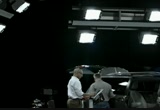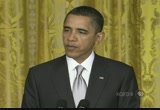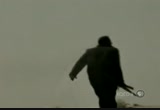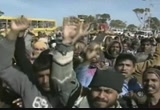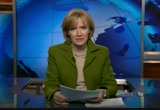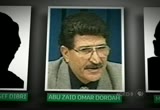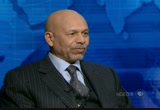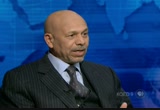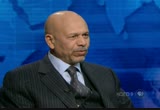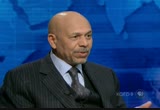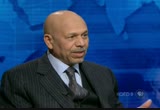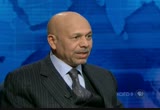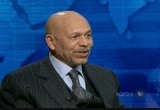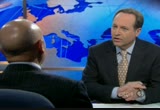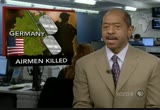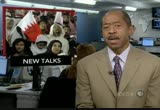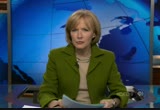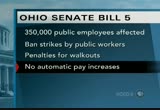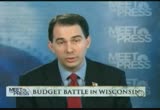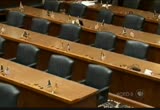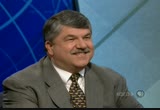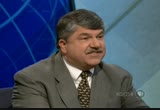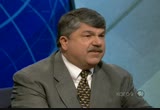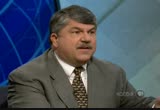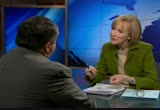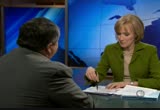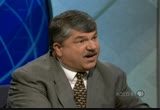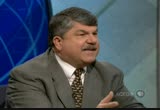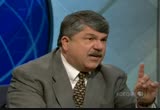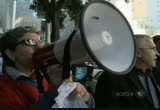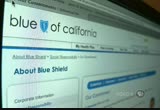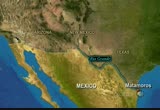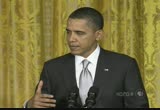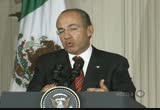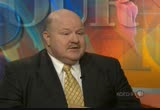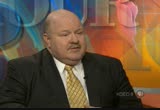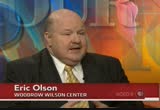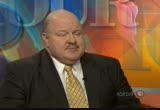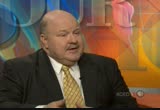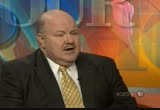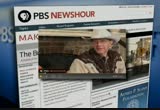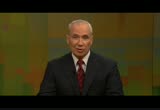tv PBS News Hour PBS March 3, 2011 6:00pm-7:00pm PST
6:00 pm
captioning sponsored by macneil/lehrer productions >> woodruff: good evening. i'm judy woodruff. president obama said the u.s. and the world must be ready to act rapidly if the crisis in libya deteriorates. and he didn't rule out the use of a no-fly zone over the country. >> brown: and i'm jeffrey brown. on the "newshour" tonight: we get the latest on the fierce fighting in the oil city of brega and the exodus of refugees fleeing the violence. >> woodruff: plus, we talk to libya's ambassador to the united states, ali suleiman aujali who denounced moammar qaddafi last week. >> brown: then, as states battle public sector unions, we have a newsmaker interview with afl-cio chief, richard trumka. >> woodruff: spencer michels reports on the outcry over hikes in insurance premiums in california.
6:01 pm
>> the new higher health insurance rates for individuals have sparked protests and calls for the government to step in. >> brown: and hari sreenivasan examines mexico's deadly drug wars, as president felipe calderon visits the white house. >> woodruff: that's all ahead on tonight's "newshour." major funding for the pbs newshour has been provided by: >> you can't manufacture pride, but pride builds great cars. and you'll find in the people at toyota, all across america. >> oil companies make huge profits. >> last year, chevron made a lot of money. >> where does it go? >> every penny and more went into bringing energy to the world. >> the economy is tough right now, everywhere. >> we pumped $21 million into
6:02 pm
local economies, into small businesses, communities, equipment, materials. >> that money could make a big difference to a lot of people. >> and by the bill and melinda gates foundation. dedicated to the idea that all people deserve the chance to live a healthy productive life. and with the ongoing support of these institutions and foundations. and... this program was made possible by the corporation for public broadcasting. and by contributions to your pbs station from viewers like you. thank you. >> woodruff: president obama issued his strongest statement yet against moammar qaddafi.
6:03 pm
at a white house news conference, the president said the libyan dictator must step down from power and leave. he also said the u.s. is joining an international rescue effort and is ready to do more, if necessary. >> i have therefore approved the use of u.s. military aircraft to help move egyptians who have fled to the tunisian border to get back home to egypt. i've authorized u.s.a.i.d. to charter additional civilian aircraft to help people from other countries find their way home. and we're supporting the efforts of international organizations to evacuate people as well. going forward, we will continue to send a clear message: the violence must stop. moammar qaddafi has lost legitimacy to lead, and he must leave. those who perpetrate violence against the libyan people will be held accountable. there is a danger of a stalemate that over time could be bloody. and that is something that we're
6:04 pm
obviously considering. so what i want to make sure of is, is that the united states has full capacity to act-- potentially rapidly-- if the situation deteriorated in such a way that you had a humanitarian crisis on our hands or a situation in which civilians were-- defenseless civilians were finding themselves trapped and in great danger. >> brown: the president also said establishing a no-fly zone over libya remains one of the options. he spoke a day after defense secretary robert gates said there had been a lot of loose talk about military action and counseled caution. today, arizona senator john mccain took issue with that assessment at a washington event with connecticut senator joe lieberman. >> joe and i have both been accused of saber-rattling, etc. we are standing up for what reagan stood for, what all of us
6:05 pm
stand for and believe in, and that is that people have god- given rights and not to live under a brutal dictator that's willing to slaughter and massacre his own citizens in order to stay in power. >> woodruff: in libya, rebels rushed to shore up their defenses in a key oil port. fighters and weapons spread across the city of brega, a day after 14 people died in heavy fighting. and crowds turned out at funerals in nearby ajdabiya. we have a series of reports from "independent television news" correspondents. first up, james mates, reporting from benghazi, on the situation in the east. >> reporter: yesterday morning, they had rushed from their homes to confront qaddafi's forces. ( gunfire ) today, they are being saluted as martyrs, volley after volley of gunfire, and a funeral attended by thousands from the town of ajdabiya. but not all the bodies they laid out ready for burial today were fighters. in one coffin was the body of hasan umran, who was 13, shot
6:06 pm
six more funerals, six more victims of colonel qaddafi's refusal to give up power. and tragically, here, no one believes these will be the last. one of those who died in this battle was kahlid taghdi, a libyan who lived in exile in manchester, the father of seven, who'd returned to rescue a daughter from the fighting. new pictures are now emerging of yesterday's fighting in which qaddafi used at least three, possibly more, airstrikes against the rebels. hasan saif said today airpower was used simply to frighten the defenders of brega, but that does not tally with the accounts of many of the men who fought here, and drove back the troops loyal to the qaddafi clan. >> brown: an international airlift kicked into gear today in tunisia, across from libya's western border. egyptian workers who fled libya were being bused from a u.n. transit camp at a key border crossing to the airport at jerba. 40 flights to egypt were scheduled today. meanwhile, the u.s., u.n. and european union donated more than $30 million to assist the exodus.
6:07 pm
alex thomson has more on the situation, from just inside tunisia. >> reporter: at the frontier itself, it's quiet and orderly today, so much so tunisian new qaddafi flags fly over the libyan checkpoint, the red crescent clearing up the rubbish now, and considering this bizarre scene. >> well, it's a very, kind of, difficult situation, because we don't have much information. we don't have much information about what's... what's next. because we don't have information on what's going on the libyan side. >> reporter: these people are about to find out, drivers queuing up this morning to drive into colonel qaddafi's libya, quite unconcerned. but going away from libya, into tunisia, to get away home to cairo, or wherever it may be, there are still not nearly enough buses, not nearly enough planes. people are getting away, but others like tong and his friends from hanoi, are facing a long wait.
6:08 pm
>> we go to vietnam, but we have to wait. because, too many people here. >> reporter: there is food, water, cigarettes, and plenty of all of them. it doesn't seem that bad. i mean, the u.n. said it was a humanitarian crisis, so we got a team together to get out here, to expect a crisis. but i think it's just logistics problem here, i can't see an actual crisis. >> reporter: the logistic problem: not enough buses or planes. and some, like these bangladeshis, are getting fed up. for the egyptians and the algerians, it's a relatively short distance home, of course. but these bangladesh men, they've been here they say for five, six, seven days already, and they say their government is doing nothing to help. at the airport, some of the tens of thousands of egyptians stranded here in recent days, british and french planes coming in to help them on their way.
6:09 pm
leaving those out in the camps dependent on organizations like telecom san pontier, to make contact with home, tell people, i'm still alive. the phone link's vital, because for these people, it's by no means certain how long they've still got to wait to get back home. >> woodruff: as the libyan drama continued, there was word from the netherlands today-- moammar qaddafi is now under investigation by the international criminal court. jonathan miller has that story. >> reporter: just four days after the u.n. security council voted unanimously to refer colonel qaddafi and his henchmen to the i.c.c., its prosecutor pledged that anyone found to have committed crimes against humanity in libya would be held to account. >> we'd like to use this opportunity to put them on notice. if forces under their command and control commit crimes, they could be criminally responsible.
6:10 pm
>> reporter: the prosecutor's investigation will center on events in eight key towns and cities, in the last two weeks of february. in tripoli, he will investigate more than 300 alleged killings of protestors. in benghazi, to the east, 257 killing, and in zawiyah, west of the capital, 124 demonstrators allegedly gunned down. he will also look into other alleged crimes in misratah, ajdabya, al-bayada and derna. today the libyan government dismissed the investigation as "close to a joke." one minister telling an arab tv channel that the court has no power over libya. that's true. libya is not a signatory, but if those now to be investigated are eventually indicted, qaddafi and company will spend the rest of their lives looking over their shoulders. >> libya is still very much an international pariah and so the number of countries where they would be willing both to receive
6:11 pm
him and also where those countries don't have relationships with the i.c.c. are very few and far between. >> reporter: we understand that those in the prosecutor's sights include three of qaddafi's sons: saif al-islam, regarded as spokesman of the regime. khamis al-qaddafi, commander of the 32nd brigade, which attacked protestors in benghazi and in tripoli. and moatassem al-gadhair, an army colonel and national security advisor. other likely suspects: the head of qaddafi's personal security, the head of libyan external security, the head of the regime's security forces and its foreign minister. all occupy positions with what's known as "command responsibility"-- in other words, they're men who knew or should have known that the alleged crimes were being committed by forces under their command. they risk indictment if the investigation shows they either ordered the attacks or failed to act to stop them. >> brown: now to the man who was appointed libya's ambassador to the united states in 2009 by moamar qaddafi.
6:12 pm
last week, ali suleiman aujali denounced the libyan leader and called for him to step down. he joins me now. welcome to you. >> thank you. >> brown: because there is some confusion, still, i want to ask you first-- do you consider yourself libya's ambassador to the u.s. still? >> of course, i am. >> brown: nothing has changed there. >> nothing has changed. i quit this regime. i have had no relationship with it since the 21st of february, and the voice of the people who are suffering is.... >> brown: we heard president obama call for qaddafi to leave. he called for a full range ofings ons. what was your reaction to this? >> thank you very much to president obama.
6:13 pm
we trust him. we want him to be firm with this regime. we want him to help our people, and we want him to work with the european and other countries to establish the no-fly zone. >> brown: you would like a no-fly zone? >> of course. this is very important. the-- they are slaughtering every day. he is using his airplanes to attack people and different places. yesterday and today, they attacked brega. this is where the oil refinery, and this is where the all the pipe lines to the coast comes from. if he hit one of the pipe lines that will be disaster not only for the libyan people but it will be disaster for the environment, also. >> brown: but you've heard concerns raised about the effectiveness of establishing a no-fly zone, about the possibility, of course, drawing the military into the situation. >> well, a fly zone is a very
6:14 pm
important issue, but i have to be clear about this. we do not want any physical presence in our land. our air are free for the international community to act, and if they act, they have to act strong. no chance for the regime to come back again and slaughter civilians. >> brown: is there now a leader of rebellion with? who is is in charge and are there coherent goals that you can point to beyond getting rid of qaddafi? >> i'm not really in favor of using rebellions. >> brown: okay. >> rebellion gives different impression. i prefer to use pressure. we are not-- we are not in favor-- or we are not fighting-- we are one country. we & we have to keep our unity. now they established the council nash council, and this council now will-- has about 30 members.
6:15 pm
>> brown: and it's led by the former interior-- >> that's led by former justice, and he's a great man. >> brown: how much backing does it have? it include people like him, who have been tied to the government in the past. >> no, this man has never been tied to the government. i know him personally. this man is a man with principles. if he claimed he wants to reform but unfortunately, he-- he is the only minister in the history of libya since qaddafi took over to resign. this man he came hoping that changes will take place in libya. but when he finds out there is no way, he just quits. >> brown: so is there a unified opposition at this point with a clear agenda? >> you mean the minister?
6:16 pm
>> brown: the minister but everyone else around the country? >> i think everybody in libya, fors or ex-officials, they don't trust this regime. and now i have to make it clear. please, don't listen to the regime that it's al qaeda and islamic extremists. libya's history never, never showed that it was an extremist country. they will think twice before they give their support to the people. and in the only that. he is using them, bring them from africa. he blackmailed the.... >> brown: help us understand the regime ask how it has stayed in place. you know qaddafi. you served in the foreign service under him for over 40 years. people would ask why? you must have known of the brutality, of the corruption, of the fear.
6:17 pm
>> my relationship with qaddafi, i saw him a few times. i don't really have a permanent relationship with him. that's never happened, you know. but we try. like-- we hope that from-- through our position we can serve the people, through our position, we can express our intentions, through our position that we can introduce some reforms. we've never been involved in any dirty job. we always consider that change must happen, and everybody in his position and his belief that this regime is bad, then at least he can give a chance to serve his own people. >> brown: so there are people in the foreign service, people in the elite part of the society, who talked about this over the years, about what could be done? >> we try very hard. we try very hard. and we said, okay. it's happening in different
6:18 pm
countries. when it cape, for example, on the 17th of february, that the people were killed using weapons anti-tanks and anti-aircraft against human beings, then i can't understand it. and even before i decided to quit, stop buying even some furniture because i said well this is time for he. i should retire and i should-- because it is a hopeless case. >> brown: do you think there is any way to reach qaddafi at this point to persuade him to step down before there is much more bloodshed? >> i think it is very difficult for qaddafi to step down. qaddafi has to be forced to leave.
6:19 pm
and i don't believe any negotiation will get qaddafi, no compromise will get qaddafi. it is the point we cannot go back. this regime must go, must go. because anything-- anything give that gives this regime a chance to survive is not on the side of the libyan people. >> brown: i have seen you saying-- do you believe he has the support of libyan people, even as we watch-- >> he's telling the international media that the people they love me. the people, they support me. the people they die for me. you can believe a stable man or stable politician or stable president tell these lies to the media? there's something wrong. 100%, there is something wrong with him. not only today, but 30 or 40 years ago. this man is-- he's running libya
6:20 pm
with fire and steel. nothing more than that. no chance for to you express your view. no chance for to you just put your idea. he believes he is god on earth and you cannot tell him this is right or wrong, never. >> brown: another ambassador aujali, thank you very much. >> thank you very much. >> woodruff: still to come on the "newshour": u.s. labor leader richard trumka; rising health insurance premiums and mexico's drug wars. but first, the other news of the day. here's kwame holman. >> holman: two new economic reports raised hopes today about the u.s. jobs picture. first-time claims for unemployment benefits were the lowest in nearly three years. and the latest measure of hiring in the service sector was the best since 2006. the news sent wall street on a buying binge. the dow jones industrial average gained 191 points to close at 12,258. and the nasdaq rose more than 50 points to close above 2,798.
6:21 pm
a retired f.b.i. agent may beac live. the state department has indications robert levinson is in southwest asia. the associated press there's irrefutable proof he is alive. levinson was working as a private investigator looking into cigarette smuggling when he vanished from an iranian island in 2007. he's now 63. authorities in germany said today the suspect in the shooting deaths of two u.s. airmen has confessed. he was identified as arid uka, an ethnic albanian from kosovo. officials say he opened fire on u.s. forces at frankfurt airport yesterday. in wiesbaden today, the region's top security official said islamic militancy may have been the motive. >> ( translated ): there are hints that he is a radicalized muslim. the evidence to date indicates that he acted on his own. it is true that he was active on facebook, that he was active in the frame of this network, but
6:22 pm
there is no network in the sense of, for instance, a terror cell. >> holman: a third u.s. airman wounded in the shooting remained in critical condition in germany. in southern sudan today, officials blamed troops from the north for killing more than 100 people this week. the fighting was focused on a town claimed by both sides, and surrounding villages. southern sudan voted to secede from the north in january. it is set to gain independence in july. in west africa, new violence has broken out in ivory coast. security forces machine-gunned a crowd of women today, killing at least six. they were protesting president laurent gbagbo's refusal to leave office. he lost last november's election to alassahne watara but has refused to concede. u.n. officials said thousands of people now are fleeing the violence. hundreds of christians in pakistan demonstrated today, over the killing of the country's only christian cabinet minister. protesters held up banners
6:23 pm
showing shahbaz bhatti, and burned tires in the streets. bhatti was gunned down wednesday by militants who had threatened him for months. elsewhere, a car bomb in pakistan's troubled northwest region killed seven people-- three of them police officers. the prime minister of egypt has resigned. ahmed shafiq was appointed by president hosni mubarak in late january. mubarak stepped down in february, and opposition forces demanded shafiq leave as well. and in bahrain, shiite opposition groups agreed to talks with the ruling sunni monarchy. the opposition is demanding a constitution and a new government. another veteran democrat is leaving the u.s. senate. daniel akaka issued a statement wednesday, announcing he will not run for reelection in 2012. akaka is 86 years old, and now in his third term. he'd had trouble raising money for another run. so far, four senate democrats have announced their
6:24 pm
retirements, along with two republicans and one independent. a federal judge in florida today ordered that states go on implementing the health care reform law. but he also said the obama administration has been slow to appeal his decision that the law is unconstitutional. and, he warned if there's no appeal within the next seven days, then the states may consider the law invalid. those are some of the day's major stories. now, back to judy. >> woodruff: now, public employee unions face a moment of truth about demands, concessions and rights, as the war over benefits and collective bargaining plays out in ohio, wisconsin, new jersey and elsewhere. the latest flashpoint: trenton, new jersey. more than 12,000 off-duty and retired police officers and firefighters gathered outside the statehouse today. they rallied in opposition to governor chris christie's proposed changes to pensions and benefits for many public workers. in ohio yesterday, workers
6:25 pm
gathered as the republican controlled state senate passed a measure that would restrict the collective bargaining rights of all unions. known as "senate bill 5", it would restrict the collective bargaining rights of roughly 350,000 teachers, university professors, firefighters, police officers, and other public employees. the bill would ban strikes by public workers and penalize those who participate in walkouts. automatic pay raises would disappear and future wage increases would be based on merit, not seniority. unionized workers could not negotiate on health care, sick time, or pension benefits. it's one of a number of measures backed by republican governors in several states that challenge the very notion of traditional bargaining with public sector unions. ohio governor john kasich praised the vote, which still
6:26 pm
must be approved by the state house saying, "this is a major step forward in correcting the imbalance between taxpayers and the government unions that work for them." in wisconsin, where senate democrats fled the state two weeks ago to avoid a vote on a similar bill, the deadlock remains. reports said both sides are talking about a compromise. but governor scott walker insisted again this week on meet the press that the state must pass a bill to curb collective bargaining to close a deficit between now and 2013. >> but i asked you a more specific question, which is what's wrong with collective bargaining? >> well, for us it's, it's about the fact that, again, as a local official, i can tell you personally time and time again because of collective bargaining when we had tough budgets in the past, when i was at the county presiding as the c.o. there, i tried to do modest changes of pension, i tried to do modest changes in health care. in fact, one year i literally tried to do a 35-hour work week to try and avoid massive layoffs and furloughs, and the union said, "forget it." embodied, emboldened by the fact that they had collective bargaining agreements, they
6:27 pm
said, "go ahead. literally lay off 400 or 500 people." and to me, laying off people in this economy is just completely unacceptable. >> woodruff: indiana has also had its share of union battles. house democrats there are preventing action on labor and education bills they oppose, which would restrict some bargaining rights. today, when most house democrats skipped a floor session, house speaker brian bosma said he was ready to start issuing fines and formal censures against them. >> i would not want my name listed in the clerk's records of the indiana house and the house journal for posterity. it would very clearly describe the actions that have been taken and the cost to the taxpayer. >> woodruff: so far, the most contentious fights have been between labor unions who tend to back democrats and republican governors and legislators. b many more states are asking public sector workers to pay more toward their health
6:28 pm
benefits and pensions, including some led by democratic governors. one late-breaking development in wisconsin. governor walker announced this afternoon that he plans to start laying off state employees tomorrow unless there's an agreement. we talk about some pivotal questions facing labor now with its most prominent leader. richard trumka president of the afl-cio-- a voluntary federation of 57 national and international labor unions, many of them subject to the changes outlined in our tape piece. we invited governors from half a dozen states including wisconsin and ohio to participate in tonight's discussion. all declined our invitation for now. much for being with us. >> judy, thanks for having me on. i really appreciate it. >> woodruff: let's start with the announcement today from governor scott walker that he's ready to send out those layoff
6:29 pm
notices unless there's some kind of agreement. is that a price worth paying? he was suggesting there that unions would rather see people laid off than make small concessions? >> first of all, it's the most outrageous thing that he's done. you heard him say that laying off is something we shouldn't do in today's economy, and yet, he's putting this choice to those workers in wisconsin. either give up your rights, or get laid off. give up your job. no american should be put in that position. this isn't about the economics, judy. they've already agreed, the unions have already agree to the exact concessions that he's asked for. this is about him trying to take away the rights of workers to come together to bargain for a middle-class life. >> woodruff: but governor walker's argument-- and i know you've heard him make it-- with collective bargain, he says unions have been able to, in effect, bleed the state of money that it doesn't have, that it's happened over years and years. previous governors haven't done anything about it, and he said has t has to stop.
6:30 pm
>> quite frankly, i've listened to him several times and i never heard him explain why he wants to do away with workers' rights to bargain for i a middle-class life. the five states in the united states that prohibit collective bargain of public employees have a cumulative debt of $225 billion. collective bargaining didn't cause that. look, this isn't about public employees. this was caused by the crisis in the recession we have. we have 15 million people out of work. put them back to work. they pay taxes, the economy starts to hum, and all of us start to do that, live better. and this governor, instead of creating the jobs that he was elected to do, is now trying to destroy more middle-class jobs that will hurt the wisconsin economy even more. >> woodruff: know, rich trumka, he and other governors frame this as this is an argument between all of the citizens of the state-- in this case
6:31 pm
wisconsin-- versus the public workers and he said when it comes down to that balance, public workers should be willing to give some. >> they have been. he asked for cuts, and they agreed to all the cuts that he asked for. remember this-- those public employees are citizens as well. this is a concerted campaign by a number of republican governors to vilify public employees. they first-- governor walker first said that wisconsin employees are paid too much. now we know from study after study, that the public employees are paid less than private employees. and then he said it's about the pension plan. and then we find out that his pension plan is nearly fully funded, 100% of assets versus liabilities. and then he says, well i need these cuts, and they agreed to them. and then again, the most outrageous thing that he did was say that to these employees, "i'm going to lay you off unless you give up your rights." now no american should be subject to that. we ought to be doing more to
6:32 pm
build the middle class and not less skrk what he's trying to do is take away nurses' firefighters' e"m" ts', snow plow drivers' their ability to come together and make their way into the middle class. >> woodruff: but if his argument and the argument of governor mitch daniels on the program the other night, in effect they're saying collective bargaining is bargaining over the public's money. it's not money eye heard governor daniels say to us this an interview the other night. he said it's not money that belongs to an individual or a company. it's the taxpayers' money so there's something out of whack here to be bargaining about. >> of course, but you have to have quality employees. take john kasich. he says everybody has to share. when he came in he gave his senior staff a 30% increase in wages and turns around to public employees and says i want to strip you not only of the pensions you've been promised and the health care that you've been promised but i want to take away your ability to negotiate
6:33 pm
for those. look, in the modern society, in the global economy, the companies that succeed are the companies that sit down with their employees, and they say, "we have a problem. let's solve it." the old way of doing things, the case iic way, the walker way is saying, employees, you have nothing to offer. shut up and sit down and accept what we give you. and the last point i'd make about that, judy, is remember something-- public employees are taxpayers as well. >> woodruff: well, let me-- i want to pick up on that because, you know, making that point are you-- how worried are you that if governor walker wins this argument in wisconsin that there could-- that it just will build and make stronger the argument against unions in these other states? we all-- >> this isn't an argument about unions. this isn't about unions. this is about a governor taking away the rights of his employees to come together to bargain for a middle-class way of life.
6:34 pm
and if he takes that away, imagine what the country would be like. if there were no unions. governor walker could come in one day and say, "oh, in order to get the balance-- to balance the budget, we're going to start paying-- employers can pay women less for the same work that nen do." or "we're going to do away with overtime." or "we're going to do away with the age limit." those are the kind of things that are at stake, because teachers right now, you know what they bargain for? they bargain for smaller class size. you know what police bargain for? they bargain for equipment that will save their lives on the street. they want to take that away from them. a police officer knows what they need. a firefighter knows what they need. and a teacher bargaining for a smaller class size is trying to bargain for all of us. >> woodruff: do you view wisconsin as a kind of waterloo for these issues that you care so deeply about? >> any time that they're taking
6:35 pm
any employee, any workers' rights away, and saying to them, as governor walker did, "you have to give up either your job or your rights," we take that seriously, and we're going to stand with them and fight. or what governor kasich did. what they did in ohio was corrupt what, that committee did. in the middle of a vote, they didn't have the votes, so they removed somebody from the committee. now, that is a corrupt way to run government. if you can't win, you'll remove people from the government? that's how they passed that bill. and i'll say this to you-- we'll stand with those employees. they want to fight for their rights, they want to fight for the middle class, they want to fight for the opportunity to get to the middle class, and we're going to be with them every step of the way. >> woodruff: let me finally ask you about the view of americans broadly. workers who have been hearing this argument, and they hear that when you put the package together, public workers, they may be on balance when it comes to pay but when you add in the
6:36 pm
benefits, the pensions, the health care benefits, that it's a richer package than what other workers may get across the aboard. so what do you say to private sector workers who are watching right now to who think public workers get a better deal? >> so in some cases they might, but in most cases they don't. take wisconsin. if you have a college degree in wisconsin, you get paid 25% less than people with a college degree in the private sector. but here's i'd say to them-- in america we've never, as a country, looked up and said,, that person over there has a pension. let's take it away from them." what we as a country have always said is, "they don't have a pension. let's figure out a way to get them one." we're the richest nation on the face of the earth. corporate america has record profits. it's not that we can't afford this. we need a shared sacrifice. work version shared. they've given up their jobs. they've lost their homes. they can't go anymore. it's time for to us come
6:37 pm
together and create jobs so that we can create the america that all of us love and is revered around the world. >> woodruff: rich tramp carc the president of afl/cio thanks for talking with us. >> thanks for having me on. i appreciate it. >> woodruff: as we do. and our invitation to governors remains open and we will bring that you perspective at a later date. >> brown: now, anger over insurance rate hikes and a battle brewing in california. "newshour" correspondent spencer michels reports. >> reporter: people got angry when blue shield of california announced recently it would raise health insurance rates for some individuals as much as 59%. it was the fourth major insurance company to announce sharp increases for those buying their own insurance and the third round of rate hikes by blue shield since last fall. >> how much is enough for these people, and how much is enough for the c.e.o.? and where did the profits go?
6:38 pm
>> reporter: on the day of this rally-- organized by the california nurses association-- the company announced it would put off the increases for 60 days at the request of the california insurance commissioner, while he reviews the new rates for mistakes and to be sure 80% of the premiums are spent on health care, as required by law. but the delay didn't appease protesters like kerry abukhalaf, a mother and small business owner who said her family has been struggling to keep up with the cost of health insurance. and our insurance plan has a $10,000 deductible. then we received another letter telling us it would go up in
6:39 pm
march another $100, which brings our total to $640 a month for our premium alone. >> reporter: abukhalaf is considering dropping her health insurance plan, except for her three-year-old son. nationally, insurance rates for individual purchasers recently jumped 20%. rose ann de moro, executive director of the nurses association, blames the hikes on high salaries and high profits, even though blue shield is not a for-profit company. >> they had the most egregious profits in history. their profits kept going up and up and up. and the question is, in a civil society, is it okay to profit off human suffering? we don't think they're victims. we think they've made enough
6:40 pm
money. >> reporter: california's insurance commissioner, dave jones, says blue shield and other non profits act like for- profit companies. >> even though they are technically a non-profit, they actually pay federal taxes because the federal government decided in 1986 that the non- profits were actually functioning pretty much like for-profit. so i don't see a whole lot of distinction between the for- profits and the non-profits. >> reporter: blue shield declined our request for an interview, but in previous written statements said it regretted the increases and blamed them on high costs of medical treatment. in sacramento, the health insurance industry lobbyist, former legislator patrick johnston, denied that the companies are after excessive profits. >> health plans nationally, the profit margin is 3% to 5% at best, and many of the health plans are not for profit. in fact, the evidence is that 85% to 87% goes to doctors,
6:41 pm
hospitals and medicines, and the other amount is overhead and profit and the profit is small. >> reporter: estimates of profit margins for health insurance companies vary widely, though several companies have reported large jumps in profits of late. but the industry says it is hurting because in the recession many healthy people have dropped individual coverage to save money. >> reporter: so the companies had to spend more on the less healthy policy holders they have kept. still, industry lobbyist johnston says high medical costs remain the main culprit. >> medical treatment costs have been three or four times as high as the inflation rates, so for instance over five years, a colonoscopy, an important test, has gone from $1,000 to $3,000. in 10 years, we have six times as many people getting cat scans at the emergency room. >> reporter: insurance commissioner jones, a democrat, agrees costs are up, but not
6:42 pm
nearly as high as the insurance companies say. >> yes, medical costs are going up, but the national average increase of medical costs has only been about 5% per year annually. we've had 10%, 20%, 30%, 40%, 50% more rate hikes year after year after year. it's ultimately unsustainable. >> reporter: as california insurance commissioner, jones has the authority to review rate increases for factual errors, but doesn't have the power to deny them, as in some other states. and that has sparked a big debate. >> i think most californians are appalled to learn i don't have that authority, and that's the authority we're trying to get through the legislature. what we have is essentially health insurers dominating the market, able to dictate whatever prices they want, and imagine if that same thing were able to happen in the electricity market. >> reporter: but the insurance industry doesn't want the commissioner to be able to roll back rates; it has beaten back previous attempts to give him that power.
6:43 pm
>> the prior approval of rates where it's happened in other states provides the illusion of cost saving because it suppresses the rates temporarily. but that suppression without any underlying cut in the regulated cost just means that insurance becomes unavailable or doctors or hospitals don't offer it, and eventually the costs go back up. >> reporter: even the insurance industry admits rates are high and something needs to be done. the new health reform law may make a difference, when health exchanges that provide competition between insurance companies kick in 2014. but even there, there's major disagreement on whether the new law will increase or decrease insurance costs. >> brown: a postscript to spencer's report. a different insurance company operating in california-- anthem blue cross-- has proposed another rate increase may 1st. that means its policy holders could see a 40% increase in less
6:44 pm
than a year. >> woodruff: finally tonight, trying to combat intensifying drug violence in his country, mexico's president visits the white house. hari sreenivasan has our story. >> sreenivasan: four years of murderous conflict; 35,000 people killed; more than 1100 just in the first two months of this year. this carnage is not happening in some far-off land, but on america's southern frontier, in mexico. much of the violence happens along the border-- stretching from matamoros in the east, along the rio grande river through nuevo laredo and juarez west to the pacific coast and tijuana. the drug war there shows no sign of letting up as mexico's powerful cartels do battle with each other and mexican authorities in broad daylight on city streets. and as president felipe calderon begins the fifth year of his fight against them with the mexican army and federal police. >> the criminals, the enemies of mexico try to infringe the laws
6:45 pm
and our democratic institutions. >> sreenivasan: today, calderon came to washington to meet with president obama. the drug war was topic a on an agenda that included the ever- present issues of immigration and trade. the two leaders are also seeking to repair damaged relations-- a byproduct of diplomatic cables disclosed by wikileaks which showed american officials lacked confidence in mexico's government and feared it too weak and corrupt to win the fight against traffickers. calderon shot back recently in an interview, voicing many mexicans' belief that the u.s. will neither accept nor combat america's major role in fueling the violence. insatiable american demand for drugs, especially marijuana and cocaine, is the backbone of the cartels' business. and they wage war with weapons smuggled from america into mexico. 90% of the firearms used by traffickers come from the u.s.
6:46 pm
one of those guns bought in texas was used to murder american immigration agent jaime zapata and wound a colleague two weeks ago as they drove to mexico city. today, homeland security secretary napolitano said the u.s. would seek extradition of suspects now in mexican custody. >> we are very mindful that the battle president calderon is fighting inside of mexico is not just his battle. it's also ours. we have to take responsibility just as he's taking responsibility. >> sreenivasan: presidents obama and calderon spoke to reporters this afternoon and mr. obama pledged to combat the southerly flow of weapons along what has been dubbed the "iron river." >> we have put more and more people behind bars for the transfer of weapons across the border into mexico. we recognize that it's not enough and that we've got to do more. part of that job is to enforce the laws that are already on the books more effectively.
6:47 pm
part of it may be to provide additional tools to law enforcement so that we can prevent the shipment of these weapons across the border. >> sreenivasan: for his part, calderon acknowledged the delicate politics of gun rights discussions in the u.s., but said there was a way to make sure fewer weapons headed south. >> ( translated ): if we can find a means of sealing ports of entry along the border, through the use of non-intrusive mechanisms for detection, we could assuredly have the safe and secure border that both nations want. i think it's a way of ensuring security without affecting the second amendment rights of u.s. citizens and, at the same time, stop the flow of drugs northbound, monies and guns southbound. >> sreenivasan: president calderon has one more year left in his presidential term. for more on the fight against the mexican drug cartels, we are joined by eric olson. he's a senior associate at the mexican institute of the woodrow wilson center. thanks for being with us.
6:48 pm
>> thanks. glad to be here. >> sreenivasan: so how do we measure this success or failure? if we started to look at the number of arrests or the number of pounds of drugs seized, it would look like a success. but then the staggering numbers of the people that are killed every year. >> well, yes, violence and homicide is definitely one indicator. it's not the only indicator. but we've seen every year in the last four years that number increase dramatically. it reached a record level of 15,000-plus last year. some of the cities in mexico are now the most violent cities in the world. one city on the border has had more murders last year than all of afghanistan. so it's really a problem. it's not spread entirely across the country. it's very much concentrate in areas along the coasts and along the u.s. border. but the country as a whole is traumatized by this and is having a real impact. >> sreenivasan: so what should
6:49 pm
we believe when we get the status updates? should we believe what's said publicly that we're getting a handle on this or do we believe what we've read privately in the wikileaks e-mails, which the president, felipe calderon, said did very serious damage and undermined a tremendous amount of the confidence his troops had? >> well, i think both countries are trying very hard. there's no question about it. the problem has been one of effectiveness. the number of killings, as we said, have gone up. you know, the price and availability of drugs in the united states remains about the same. so we haven't had a major impact on that. there's just a host of various criterias that would suggest that if they were being successful, they would come down or show improvements. and thus far, it hasn't happened. now, we have to keep in mind this is a very long-term problem. you can't just simply deploy forces and solve this problem. it has to do with the country's education system. it has to do with long-ingrained
6:50 pm
corruption in mexico. it has to do with problems of consumption in the united states that we haven't been very successful at dealing with. so it might be inappropriate to, you know, try to judge us within you know, a few years or a couple of months. it's a long-term problem. >> sreenivasan: are there some best practices we can pick up from other countries who have been through this in central and latin america, perhaps colombia, lessons learned that can be applied? >> yes, there are some good experiences. italy at one point did do a lot to break the power of organized crime in one part of the country. there are other experiences. i mean, generally, people feel like the best approach is a multileveled approach. you know, you'd have law enforcement that's strong, professional, cable. you have a vibrant economy that provides opportunity and jobs for young people. you have an education system that works. those things take a long time to develop.
6:51 pm
and the issue now is, is there going to be that long-term commitment? >> sreenivasan: and speaking of those commitments, the u.s. has pledged about $1.6 billion or so. there's only been about $400,000 or so of those dollars that have been going out. why is it take so long? >> it has been embarrassingly slow, i have to say. there are explanations for it. it's high-tech weaponry that takes a long time to produce and ship and so on. but i think the obama administration, the bush administration before them, recognizes that it's been an extremely slow and frustrating process. i think it's been an embarrassment, frankly, that after this many years, they've only transferred $400 million, a third of that amount of money. they say they're going to have another $500 million by this fall. but it's still very slow. >> sreenivasan: what about the possible impact here of jaime zapata, and his shooting just a few weeks ago? do you think that this is going to signal any sort of a change
6:52 pm
in policy? >> probably in the end not. it's, obviously, a huge tragedy, very worrisome, especially if it turns out that the cartels are going to begin to target u.s. agents there. there's no evidence of that yet. this is a very unusual-- this is the first u.s. agent killed in mexico in 20-some years. but if that were the direction it took it would be very worrisome. there's a great irony, i think, as they pointed on out in the opening piece, that the actual weapon used in his murder came from a store in texas or alleged came from a store in texas. so again, it's an indication of how intertwined both countries are and how they have to work together to fix the problems in their own country, but also work together to confront organized crime. >> sreenivasan: is there anything that either of these presidents can do as a policy to try and restrict that flow of weapons and cash? >> oh, there's a lot they can do.
6:53 pm
in the u.s., you know, obviously there are a number of laws. president calderon talked about reinstating the assault weapon ban. there's a lot of things president obama could do without going to congress. but you always come up against a very complex political terrain in the united states that makes that, you know, very, very difficult. so the question is do we want to value the effort between mexico and the united states or do we let it get caught up in the political squabbling in the u.s. congress or whatever the political debate is in the united states. >> brown: again, the major developments of the day: president obama announced u.s. military transport planes will help airlift thousands of egyptian workers who've fled libya for tunisia. and he did not rule out imposing a no fly zone over libya. stocks shot up on hopeful signs about hiring. the dow jones industrial average gained 191 points.
6:54 pm
and german authorities said an ethnic albanian man has confessed to killing two american airmen on wednesday. they said the gunman may have been driven by islamic militancy. and to kwame holman for what's on the "newshour" online. kwame? >> holman: you can watch all of president obama's news conference with mexican president calderon and read dispatches from juarez by a new america media reporter. that's on our "world" page. plus on paul solman's "making sense" page, we've posted the winning song from our financial crisis lyrics-writing contest sung by economics country crooner merle hazard all that and more is on our web site, newshour.pbs.org. judy? >> woodruff: and that's the "newshour" for tonight. i'm judy woodruff. >> brown: and i'm jeffrey brown. we'll see you online and again here tomorrow evening with mark shields and david brooks, among others. thank you and good night. major funding for the pbs newshour has been provided by:
6:55 pm
>> oil companies have changed my country. >> oil companies can make a difference. >> we have the chance to build the economy. >> create jobs, keep people healthy and improve schools. >> ... and our communities. >> in angola chevron helps train engineers, teachers and farmers; launch child's programs. >> it's not just good business. >> i'm hopeful about my country's future. >> it's my country's future. >> you can't manufacture pride, but pride builds great cars. and you'll find in the people at toyota, all across america. and by the alfred p. sloan foundation. supporting science, technology, and improved economic performance and financial
6:56 pm
literacy in the 21st century. and with the ongoing support of these institutions and foundations. and... this program was made possible by the corporation for public broadcasting. and by contributions to your pbs station from viewers like you. thank you. captioning sponsored by macneil/lehrer productions captioned by media access group at wgbh access.wgbh.org
211 Views
IN COLLECTIONS
KQED (PBS) Television Archive
Television Archive  Television Archive News Search Service
Television Archive News Search Service 
Uploaded by TV Archive on

 Live Music Archive
Live Music Archive Librivox Free Audio
Librivox Free Audio Metropolitan Museum
Metropolitan Museum Cleveland Museum of Art
Cleveland Museum of Art Internet Arcade
Internet Arcade Console Living Room
Console Living Room Books to Borrow
Books to Borrow Open Library
Open Library TV News
TV News Understanding 9/11
Understanding 9/11
